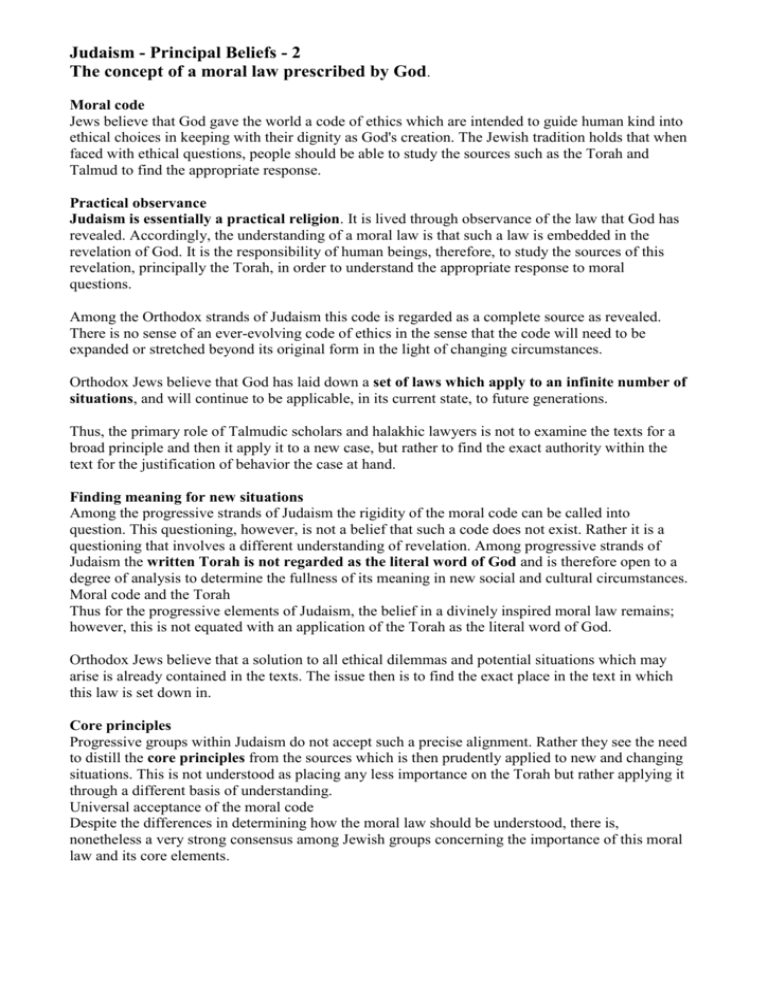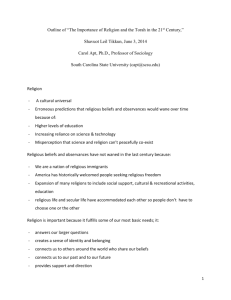Judaism: Moral Law, Beliefs, and Interpretations
advertisement

Judaism - Principal Beliefs - 2 The concept of a moral law prescribed by God. Moral code Jews believe that God gave the world a code of ethics which are intended to guide human kind into ethical choices in keeping with their dignity as God's creation. The Jewish tradition holds that when faced with ethical questions, people should be able to study the sources such as the Torah and Talmud to find the appropriate response. Practical observance Judaism is essentially a practical religion. It is lived through observance of the law that God has revealed. Accordingly, the understanding of a moral law is that such a law is embedded in the revelation of God. It is the responsibility of human beings, therefore, to study the sources of this revelation, principally the Torah, in order to understand the appropriate response to moral questions. Among the Orthodox strands of Judaism this code is regarded as a complete source as revealed. There is no sense of an ever-evolving code of ethics in the sense that the code will need to be expanded or stretched beyond its original form in the light of changing circumstances. Orthodox Jews believe that God has laid down a set of laws which apply to an infinite number of situations, and will continue to be applicable, in its current state, to future generations. Thus, the primary role of Talmudic scholars and halakhic lawyers is not to examine the texts for a broad principle and then it apply it to a new case, but rather to find the exact authority within the text for the justification of behavior the case at hand. Finding meaning for new situations Among the progressive strands of Judaism the rigidity of the moral code can be called into question. This questioning, however, is not a belief that such a code does not exist. Rather it is a questioning that involves a different understanding of revelation. Among progressive strands of Judaism the written Torah is not regarded as the literal word of God and is therefore open to a degree of analysis to determine the fullness of its meaning in new social and cultural circumstances. Moral code and the Torah Thus for the progressive elements of Judaism, the belief in a divinely inspired moral law remains; however, this is not equated with an application of the Torah as the literal word of God. Orthodox Jews believe that a solution to all ethical dilemmas and potential situations which may arise is already contained in the texts. The issue then is to find the exact place in the text in which this law is set down in. Core principles Progressive groups within Judaism do not accept such a precise alignment. Rather they see the need to distill the core principles from the sources which is then prudently applied to new and changing situations. This is not understood as placing any less importance on the Torah but rather applying it through a different basis of understanding. Universal acceptance of the moral code Despite the differences in determining how the moral law should be understood, there is, nonetheless a very strong consensus among Jewish groups concerning the importance of this moral law and its core elements. The essential purpose of this divinely inspired moral law is to ensure that human beings live in such a manner so as to enhance and not diminish their own God given dignity or the dignity of another. Ten Commandments The most basic formulation of the moral law is found in the Ten Commandments which essentially provide for a way of relating to one another that does not do harm to or undermine the dignity of the other. Many of the elements of the Covenant requirements are centered on aspects of inter personal relationships. Obligation to intervene on behalf of others Underpinning all of these requirements of community is the essential lesson of the Exodus that people are to live in freedom and nothing should be done that denies this freedom to another person. God's intervention to liberate the Hebrew people from slavery in Egypt provides a clear indication of the obligation to intervene on behalf of others. This is particularly so for the most vulnerable members of the community. Thus the moral law has led to a fundamental commitment in Judaism to ensure that those in need receive the help and support of others.







